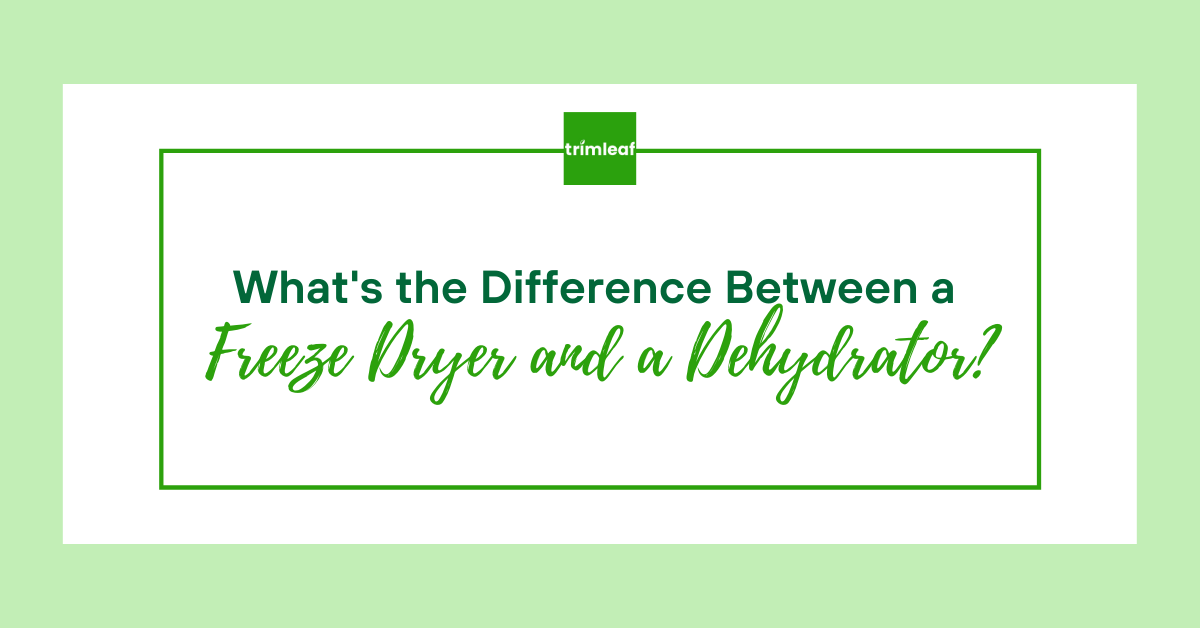
When it comes to preserving fresh food for long periods, you’d want to remove the moisture. Moisture is what causes food to spoil without any preserving agents. In an ideal scenario, you’d want to reduce the need for preserving agents to maintain the natural flavor of food. When removing moisture in food, two things come to mind: Dehydrators and
Freeze Dryers.
While they both preserve food by removing moisture, they differ in how each operates and the end product they create. If you decide on getting either machine, here are some points that will help you decide which is best for you.
How a Dehydrator Work
Dehydration is a simple drying process. To preserve food, such as herbs, lay it on a mesh screen and air dry it. Air drying eliminates moisture, which prevents bacteria from developing inside the food.
Dehydrators take this concept up a notch and let your material dry faster at temperatures between 95 and 155 degrees Fahrenheit. The time and heat depend on your material. Delicate ones like herbs dry at lower temperatures, while meat takes a hotter temperature.
Pros of Dehydration
- Affordable and readily available.
- Easy to use and operate.
- Great for making snacks like jerky and fruit leathers.
Cons of Dehydration
- High temperatures can damage some vitamins and enzymes during the drying process.
- Longer drying times compared to freeze drying.
- Dehydrated food can lose its original texture, flavor, and nutrients.
- Shorter shelf life (typically 1-3 years) compared to freeze-drying.
- Only limited food can be preserved.
Foods Best Suitable for Dehydration
As a general rule of thumb, foods that are relatively uniform in texture and have lower water content tend to dehydrate more successfully such as:
- Fruits (apples, bananas, berries)
- Vegetables (tomatoes, peppers, mushrooms)
- Herbs and spices
- Meat (jerky)
How a Freeze Dryer Works
Freeze dryers, like the Harvest Right home freeze dryers, are a little more complicated. They feature three steps to remove as much moisture as possible inside. Unlike dehydrators, freeze dryers process your material through Lyophilization.
In lyophilization, your material is heated to -30 degrees Fahrenheit to freeze the water content. This process usually takes around nine hours, depending on the Freeze Dryer. After that, the freeze-drying chamber is sealed in a vacuum, expelling the ice as vapor. This process is repeated until moisture levels are below 5 – 10 percent.
Pros of Freeze Drying
- Superior shelf life (up to 25 years for most foods).
- Retains most nutrients, flavor, and color of the original food.
- Faster rehydration times compared to dehydration.
- Preserve various foods, including dairy products, cooked meals, and meats.
Cons of Freeze Drying
- Significantly higher cost compared to dehydrators.
- It is bulkier and requires more counter or room space.
- Longer drying times than dehydrators.
- Requires a vacuum pump (may need oil changes for the home freeze dryer.)
Foods Suitable for Freeze-Drying
As a general rule of thumb, foods with higher moisture content or delicate structures are often better suited for freeze-drying than dehydration.
- Fruits (strawberries, raspberries, mangoes)
- Vegetables (corn, peas, broccoli)
- Meats (raw or cooked)
- Dairy products (cheese, yogurt)
- Ready-to-eat meals
Factors to Consider When Choosing the Right Machine for Long-Term Food Storage
Size and Weight

Dehydrators are smaller compared to freeze dryers. They easily fit in your kitchen and weigh around 13 pounds. Some appliances, like the air fryer, also integrate dehydrator features.
On the other hand, freeze dryers occupy more space in your home. Many in the market take up as much space as a consumer refrigerator. On top of that, some freeze dryers need a vacuum pump to facilitate the extraction of the oil required for the freeze dryer.
Detailed Cost Comparison
| Factor | Dehydrators | Freeze Dryers |
|---|---|---|
| Initial purchase cost | $40 - $300 | $2,400 - $5,000+ |
| Electricity usage per batch | Low (0.5-1.5 kWh) | High (3-5 kWh) |
| Average monthly operating cost | $5 - $10 | $30 - $50 |
| Maintenance costs (annual) | Minimal ($0-20) | Moderate ($100-200 for oil changes) |
| Cost to preserve 1lb of food | ~$0.30 | ~$1.50 |
| Return on investment timeline | 6 months - 1 year | 3-5 years |
Nutritional Retention Comparison
One of the most important factors when choosing a food preservation method is how well it maintains the nutritional content of your food. Here's how freeze drying and dehydration compare in nutritional retention:
Vitamin Retention (% of original content)
Expert Opinions: What the Pros Say
"For commercial kitchens that need to preserve delicate flavors and textures, freeze drying is unmatched. The investment pays for itself in reduced food waste and enhanced menu flexibility."
"In my 15 years of emergency preparedness consulting, I've seen freeze-dried foods maintain quality for 20+ years. For serious preppers, a freeze dryer is the gold standard despite the higher initial cost."
"From a nutritional standpoint, freeze drying preserves significantly more nutrients than dehydration, especially water-soluble vitamins like vitamin C and B-complex vitamins."
Try Before You Buy: DIY Testing Methods
Not ready to commit to a full-fledged dehydrator or freeze dryer? Here are some ways to test these preservation methods before making a significant investment:
DIY Dehydration Test
- Oven Method: Use your oven on its lowest setting (preferably 140°F or lower) with the door slightly ajar. Place thinly sliced fruits or vegetables on a parchment-lined baking sheet.
- Fan Method: For herbs and leafy greens, bundle them together and hang them in a warm, dry place with good air circulation.
- Sun Drying: In hot, dry climates, place thinly sliced fruits on a screen-covered tray in direct sunlight for 2-3 days.
✓ Tip: If your oven doesn't go below 170°F, place a wooden spoon in the door to keep it slightly open and prevent overheating.
Testing Freeze-Dried Products
While you can't easily replicate freeze drying at home, you can:
- Sample Commercial Products: Purchase small packages of freeze-dried fruits, vegetables, and meals from outdoor/camping stores or online retailers.
- Community Resources: Check if your local community has a "tool library" or makerspace with a freeze dryer you can rent time on.
- Co-op Opportunities: Find local food preservation groups where members share equipment costs.
✓ Tip: Some freeze dryer manufacturers offer sample kits or trials - ask about these options before purchasing.
Environmental Considerations
When choosing between a dehydrator and freeze dryer, consider these environmental factors:
Dehydrator
- Lower energy consumption (typically 300-1000 watts)
- Shorter operating times for most foods
- Less efficient food preservation may lead to more food waste over time
- Most units are made from plastic components
Freeze Dryer
- Higher energy consumption (approximately 1500-1800 watts)
- Longer operating cycles (20-40 hours per batch)
- Superior food preservation reduces long-term food waste
- Longer-lasting foods mean fewer grocery trips
- Vacuum pump requires oil changes (unless using oil-free option)
Tips for Reducing Environmental Impact
- Run your dehydrator or freeze dryer with full loads to maximize energy efficiency
- For freeze dryers, consider investing in an oil-free pump to reduce maintenance waste
- Use reusable silicone storage bags instead of single-use plastic bags for preserved foods
- Choose local, seasonal produce to reduce the carbon footprint of your preserved foods
- Plan your preservation schedule around off-peak electricity hours if possible
Rehydration Tips and Tricks
One of the most important aspects of food preservation is knowing how to properly rehydrate your preserved foods. Here are some expert tips for both dehydrated and freeze-dried foods:
Dehydrated Food Rehydration
Hot Water Method
Best for: Vegetables, fruits, and herbs for cooking
Cold Water Method
Best for: Fruits for snacking or baking
- Place dehydrated fruit in cold water
- Refrigerate for 2-8 hours (overnight works well)
- Drain thoroughly before use
Direct Cooking Method
Best for: Rice, pasta dishes, and soups
- Add dehydrated ingredients directly to recipes
- Add 15-20% more liquid than your recipe calls for
- Extend cooking time by approximately 10 minutes
Freeze-Dried Food Rehydration
Room Temperature Water
Best for: Most freeze-dried foods
- Place freeze-dried food in a bowl
- Add room temperature water just until food is covered
- Wait 5-10 minutes (much faster than dehydrated foods)
- Drain any excess water
Spray Bottle Method
Best for: Delicate fruits and desserts
- Place freeze-dried items in a shallow bowl
- Lightly mist with a spray bottle
- Wait 2-3 minutes, then spray again if needed
- This method helps maintain some crispness
Milk Rehydration
Best for: Freeze-dried berries for cereal or desserts
- Add freeze-dried fruit directly to cold milk or yogurt
- Let sit for 2-3 minutes before consuming
- The fruit will absorb liquid and release flavor
What Food Are You Preserving?
While dehydrators and freeze dryers remove moisture for long-term food storage, the ideal method depends on what you're preserving. Dehydrators are budget-friendly and work well for fruits like apples and bananas (think fruit leathers!), sliced vegetables for soups and stews, herbs and spices, and jerky.
On the other hand, freeze dryers preserve a wider variety of foods. They maintain the shape and texture of fruits like strawberries and raspberries much better than dehydrators, making them an excellent choice for those who want to enjoy the taste and nutritional benefits of these delicate fruits year-round. In fact, if you're wondering
is freeze dried fruit healthy, the answer is yes – the freeze-drying process preserves most of the nutrients found in fresh fruit.
Freeze dryers are also used to create unique treats like
freeze-dried candy, which transforms the texture of your favorite sweets into a light and crunchy delight. Additionally, freeze dryers work well for various cuts of vegetables and raw and cooked meats. But the real advantage comes with their ability to handle dairy products like cheese and yogurt and even pre-cooked meals – perfect for emergencies or outdoor adventures.
The Verdict: Which One Should You Get?
A dehydrator is a good option for those on a budget who need more space for dried foods. It fits easily on your countertop and is included in some kitchen appliances.
A dehydrator is a good option for those on a budget and who need more space. It fits easily on your countertop and is sometimes included with other kitchen appliances.
A freeze dryer is a good option for anyone with space to spare for a more massive machine and who wants a longer-term preservation solution. As freeze dryers are a hefty investment, it’s also best to preserve large amounts of material to make the most of them.
Dehydrators and freeze dryers are welcome solutions for preserving or curing material. While they are designed for different users, they both achieve the goal of removing as much moisture from your material as possible. Both machines have advantages and disadvantages, so you can’t say one is superior. However, with the pros and cons listed, you should be able to make an informed decision.
In summary, here's how you should approach the topic:
Choose a dehydrator if:
- You're on a budget and looking for an affordable option.
- You have limited counter or storage space in your kitchen.
- You primarily want to make snacks like jerky, fruit leathers, and dried herbs.
- You don't mind longer drying times and a slightly shorter shelf life (1-3 years).
- You're preserving foods with lower moisture content and uniform texture.
Choose a freeze dryer if:
- You have the budget for a higher-cost appliance and are willing to invest in long-term food preservation.
- You have ample space to accommodate a larger machine, similar to volumetric size as a consumer refrigerator.
- You want to preserve a wide variety of foods, including fruits, vegetables, meats, dairy products, and even complete meals.
- You prioritize superior shelf life (up to 25 years for most foods) and want to maintain the original texture, flavor, and nutrients of the food.
- You don't mind the additional maintenance required, such as oil changes for the vacuum pump (if applicable).
- You plan to preserve large quantities of food or if you want to start a freeze-dried business to make the most of your investment.
Choosing between these methods boils down to your priorities. If budget is a major concern, dehydrators offer a cost-effective solution. Ultimately, the best choice depends on your specific needs and whether you prioritize affordability, space, extended shelf life, or superior food preservation.
Freeze Dryers vs Dehydrators: Frequently Asked Questions
- ▼What is the difference between freeze drying and dehydrating?
- Freeze drying involves removing water from food by freezing it and then sublimating the frozen water, while dehydrating removes water by using heat.
- ▼How do freeze dryers and dehydrators differ in terms of food preservation?
- Freeze dryers preserve food by freezing it at low temperatures and removing water through sublimation, whereas dehydrators use heat to remove water at higher temperatures.
- ▼What are the benefits of dehydrating food compared to freeze drying?
- Dehydrating food is a quicker and more cost-effective method of food preservation, but it may result in a loss of some nutritional value compared to freeze drying.
- ▼How does freeze drying retain the nutritional value of food products?
- Freeze drying retains more nutrients in food compared to dehydrating, as the low temperature process helps to preserve the integrity of the nutrients.
- ▼Can you explain the process of freeze drying and dehydration?
- Freeze drying involves freezing the food, creating a vacuum to remove the frozen water, while dehydration uses heat to remove moisture from the food.
- ▼What are the shelf life differences between freeze-dried and dehydrated foods?
- Freeze-dried foods tend to have a longer shelf life compared to dehydrated foods, as the freeze drying process removes more moisture from the food.
- ▼How do freeze dryers and dehydrators differ in their methods of preserving food?
- Freeze dryers use a freezing and sublimation process to preserve food, while dehydrators use heat to remove moisture and preserve the food products.




